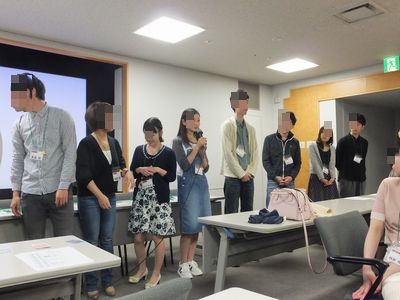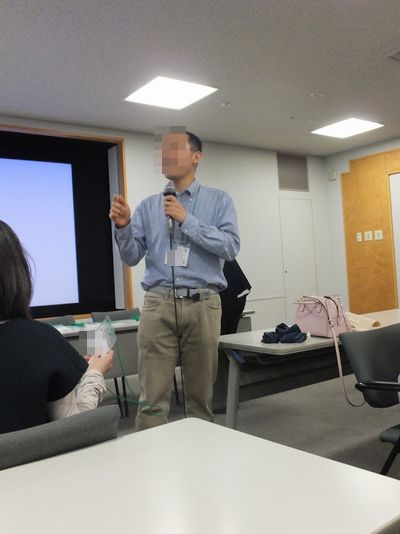1.新人の方の自己紹介

今回13名もの新人さんがご参加くださいました!
2.Nさんからのマテリアル紹介

パワフルにユーモラスに、マテリアル紹介いただきました!
3.会場の様子

グループによるディスカッションの違いも興味深いです。
:::::::::::::::::::::::::::::::::::::::::::::::::::::::::::::::::::::::::::::::
《 今回のworkshop 》
○workshop参加人数:85名(うち新人の方:13名)
○【前半】:学校教育に適したスポーツ
○【後半】:The Puzzle of Motivation
:::::::::::::::::::::::::::::::::::::::::::::::::::::::::::::::::::::::::::::::::
みなさまこんばんは、E’s club幹事のKです。
4月23日(土)開催の第126回workshopの詳細をお送りいたします。
前半のマテリアルはNさんにご作成いただきました。
今回のテーマは「学校教育に適したスポーツ」です。
E先生には後半のマテリアルをご作成いただきました。
今回はTEDの動画を事前にご視聴お願いいたします。
[今週のマテリアル]
<FIRST HALF>
“School rugby harms children and should not be promoted, says prof”
Thousands more children could be seriously injured playing rugby because of the Government’s ‘worrying’ plans to promote the sport in schools, a public health expert has claimed.
Professor Allyson Pollock, of Queen Mary University of London, said that youngsters were regularly harmed playing the sport but warned that levels of injury were not being properly monitored.
The government has pledged to increase the prominence of competitive sports and is encouraging schools to link up with local rugby clubs.
However Professor Pollock said figures showed that one in eight children suffers an injury serious enough to be kept of the pitch for seven days in a season. She called for injury surveillance and prevention programmes to be established without schools.
“Given that children are more susceptible to injuries such as concussion and often take longer to fully recover, the government’s plan is worrying,” said Prof Pollock, writing in the British Medical Journal.
“Not enough is being done by the government to put in place injury monitoring and prevention strategies.
“Only by collecting injury data and by providing feedback to individuals and organisation working on safety initiatives will the short and long term impact of injury prevention programmes, whether for rugby or any other sport, be known.”
However critics said school injury statistics were not clear cut as teachers were generally more cautious and children were often kept on the bench even if they had slight injuries such as a muscle tear.
Brian Moore, the English former rugby union hooker, said that unless the injuries were compared against other sports they were meaningless.
“Without a ranking of risk per sport parents have no way of knowing whether rugby is any more dangerous than any other sport and cannot make a reasoned choice.
To try and prevent sport being promoted on the basis of such flawed methodology is not only poor it is wrong.
“There is no mention of the significant benefits of kids playing sport, rugby or otherwise, in terms of better health, increased alertness in class and thus better education.
“There is no mention of the significant lessons for life that playing a team sport brings – camaraderie; anti-social behaviour modification; learning to win/lose/ teamwork/ leadership and so on.”
Studies have found most rugby injuries occur during the tackle but that scrums are the most dangerous phase of play.
Recent rule changes, such as the introduction of non-contested scrums, may have reduced the number of permanently disabling spinal injuries, but their effectiveness has yet to be properly evaluated, the researchers say.
However, insufficient attention has been paid to the tackle as the major cause of injury in this collision sport.
The government hopes to put 1,300 links in place between schools and rugby union organizations and a further 1,000 with rugby league.
In England, a new collaboration between the Rugby Football Union and the University of Bath aims to collect injury data from participating schools for under 15s, under 16s and under 18s and to develop new warm-up and training programmes.
Last year Michael Carter, a paediatric neurosurgeon at Bristol Royal Hospital for Children, said that smaller children should not be forced to play rugby with bigger boys.
In British schools where rugby is taught, boys as young as 10 are expected to engage in some kind of contact competition.
But Mr Carter said children often had vastly different physical statures and it was unfair to match smaller children against their bigger classmates
He has called for creative match scheduling as well as preseason and early season strength and conditioning training. In addition, weight as well as age should be considered during squad selection.
The BMJ Editor in Chief, Dr Fiona Godlee said that the current state of monitoring of rugby injury in schools is a ‘scandal’ which needs ‘urgent remedy.’
Tasks
1. Share your experiences of playing sports in classes and club activities during your school days. Which sport did you play? How did you find it?
2. Discuss the advantages and the disadvantages of letting children play rugby, and make your table’s decision whether it should be promoted at school.
3. In Japan, a view that gymnastic formation – “kumitaiso” in Japanese – is too dangerous for children to perform has recently been prevailing. Discuss the advantages and the disadvantages of letting children perform gymnastic formation, and make your table’s decision whether it should be promoted at school.
4. Taking account of the discussions in Tasks 2 and 3, prepare your table’s proposal for the sport suitable for school education.
5. In the last five minutes of the first half, a member of the tables chosen by Mr K should present each of their proposals for the sport suitable for school education and give reasons behind it.
<LATTER HALF>
1. Do you like your job? Why or why not?
2. What do you think about the people you work with? Do you enjoy working with them? Why or why not?
3. What makes a job fun and motivating to work at?
4. Why do you think Dan Pink says paying more money for complex work isn’t motivating?
5. What are your ideas for motivating people? Is money enough? What other things make work a fun place to work?
6. If you could make a suggestion to your company’s HR department to make your company more fun to work at and more enjoyable, what would be your suggestions?
***********************************************************
私たちと一緒に英語コミュニケーション能力を鍛えませんか?
ご興味を持たれた方は、
入会申込フォーム
https://english-speaking-club.com/cms/?page_id=93
よりお申し込みください。お待ちしています!
***********************************************************